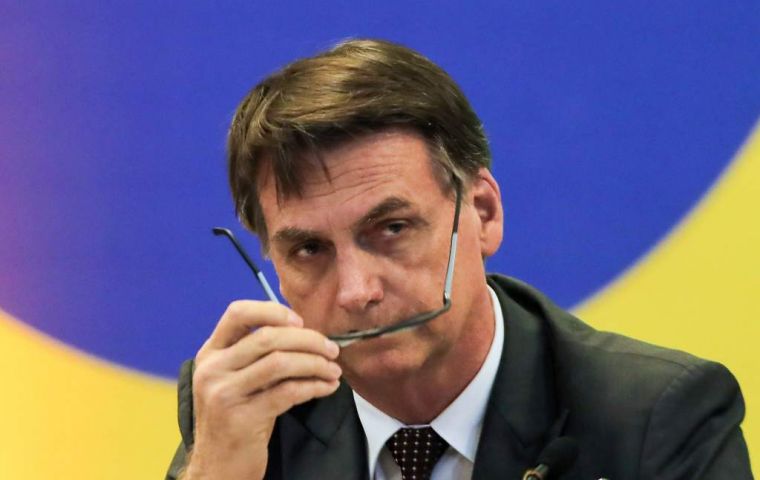MercoPress. South Atlantic News Agency
Foggy burial for Bolsonaro's promises of a transparency era
 Handed down as Bolsonaro declared a new era of transparency at Davos, the decree is likely to put more public records out of reach of civic groups, journalists
Handed down as Bolsonaro declared a new era of transparency at Davos, the decree is likely to put more public records out of reach of civic groups, journalists Brazil's new far-right government on Thursday gave hundreds more public servants the power to keep official records from the public for decades by labeling them “secret” and “ultra-secret.” Vice President Hamilton Mourao, standing in while President Jair Bolsonaro was at the World Economic Forum in Davos, signed the decree expanding exceptions within the 2011 transparency law.
Handed down as Bolsonaro declared a new era of transparency in Brazilian politics and business at Davos, the decree is likely to put more public records out of the reach of civic groups, journalists and ordinary citizens.
“You need to have a balance between security and transparency,” Mourao told reporters after the decree was published. “This just reduces bureaucracy when you classify secret documents.”
“This decree is a step backward with respect to transparency, access to information and social control, and this decree simply must be revoked,” said Gil Castello Branco, head of government transparency group Contas Abertas.
The move modifies Brazil's 2011 Access to Information Law, passed to guarantee access to local, state and federal government records in the name of strengthening democracy.
The law created exceptions to protect highly sensitive materials, including “ultra-secret” information, which is withheld from the public for 25 years. Previously, the designation could only be made by the president, vice president, cabinet-level officials, military commanders and heads of permanent diplomatic and consular missions abroad.
The new decree allows politically appointed civil servants, agency heads and top executives at public companies to make that designation. The decree also vastly expanded the circle of officials who can make the “secret” classification, which seals records for 15 years.
In total, the government gave more than 1,000 public servants greater discretion in shielding government activities from public view, according to Marina Atoji, who heads the Brazilian Association of Investigative Journalism.
“One way to guarantee that secretive classifications will be the exception is by limiting how many people have the power to make them. By radically expanding the number of people, this decree weakens that guarantee,” said Atoji.
Bolsonaro, who took office on Jan. 1, has embraced an antagonistic relationship with the press and non-government organizations on the campaign trail and now in office, disparaging unfriendly outlets as “fake news” and threatening to cut public advertising in specific newspapers.




Top Comments
Disclaimer & comment rules-

-

-

Read all commentsIs ANYONE surprised?
Jan 25th, 2019 - 10:36 am +1@DemonTree:
Jan 25th, 2019 - 12:53 pm +1REF: Is ANYONE surprised?
Why should anyone be?
Weren't they wanting him to be anything BUT “transparent”? And pl. note that he has not even begun:
http://domtotal.com//img/charges/2448.jpg
I need some of what he's smoking...
Jan 25th, 2019 - 03:02 pm +1Commenting for this story is now closed.
If you have a Facebook account, become a fan and comment on our Facebook Page!